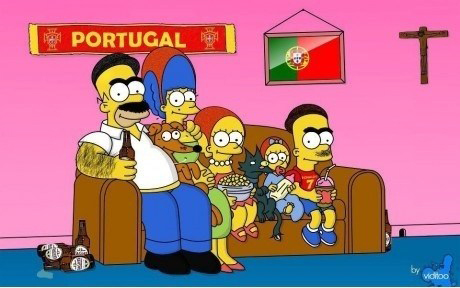Every country and language has it’s expressions. To people from different countries some of those might sound quite funny or strange. These are the 20 funniest Portuguese expressions and how to use them.
Please read very carefuly:
- A Portuguese does not ‘give up,’ he ‘takes his little horse away from the rain.’ (Tirar o cavalinho da chuva.)
- A Portuguese does not ‘have a problem,’ he ‘is done to the beef.’ (Estou feito ao bife!)
- A Portuguese does not want you ‘to leave him alone,’ he wants you to ‘bother Camões.’ (Vai chatear o Camões.)
- A Portuguese does not ’cause problems,’ he ‘breaks all the dishes.’ (Partir a loiça toda.)
- For a Portuguese, you are not ‘sexy,’ you are ‘as good as corn.’ (Boa como o milho.)
- A Portuguese does not ‘work a lot,’ he ‘gets water up his beard. (Água pela barba.)
- A Portuguese does not ‘talk about the same thing over and over again,’ he ‘turns the record and plays the same song’. (Gira o disco e toca o mesmo.)
- A Portuguese does not do something ‘to show off,’ he does it ‘so the English can see it.’ (Para inglês ver.)
- A Portuguese is not ‘shameless,’ he has ‘a rotten face.’ (Cara podre) Or he ‘has a lot of cans’. (Ter muita lata.)
- A Portuguese does not just ‘shut up and listen to things he does not like,’ he ‘swallows frogs.’ (Engolir sapos.)
- A Portuguese does not tell you to ‘piss off,’ he tells you ‘to go to the place where Judas lost his boots.’ (Onde Judas perdeu as botas.) Or, he will tell you to ‘go away and comb monkeys’. (Vai pentear macacos.)
- A Portuguese does not ‘wake up angry,’ he ‘wakes up with his feet outside’. (Com os pés de fora.)
- A Portuguese is not ‘upset,’ he is ‘with olive oil’. (Estar com os azeites.)
- A Portuguese is not ‘experienced’, he has ‘spent many years turning chickens’ (São muitos anos a virar frangos.)
- A Portuguese does not ‘think you have strange ideas,’ he ‘thinks you have little monkeys inside your head’. (Ter macaquinhos na cabeça.)
- For a Portuguese, something is not ‘really simple,’ it is ‘bread to bread and cheese to cheese’. (Pão, pão, queijo, queijo.v)
- A Portuguese does not ‘die,’ he ‘goes from this one to a better one.’ (Ir desta para melhor.) Or, he ‘goes off with the pigs’. (Ir com os porcos.)
- A Portuguese does not ‘feel suspicious,’ he ‘has a flea behind his ear’. (Estar com a pulga atrás da orelha.)
- A Portuguese is not ‘worry free,’ he ‘is sitting under banana tree’. (Estar a sombra da bananeira.)
- A Portuguese is not ‘clumsy,’ he ‘looks like a silly cockroach’. (Barata tonta.)


0 reacties